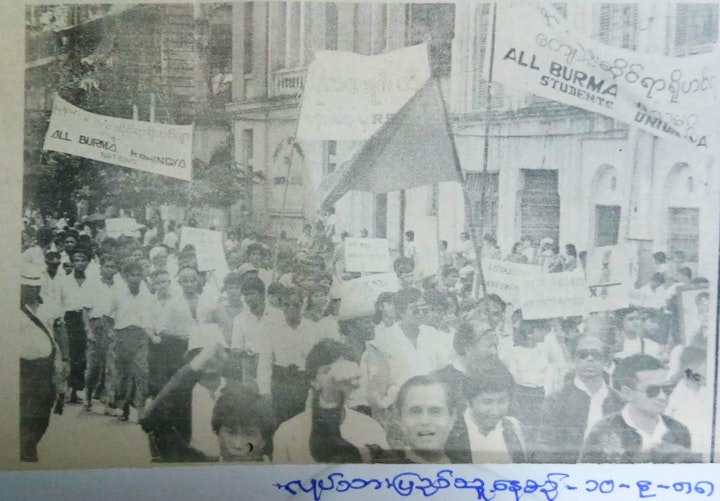I was only 10. Everyday we would assemble at school and go marching. Wearing white shirts and green longyi, we would march from Mayangone To Shwedagon Pagoda. Our teachers marched along with us. Students, civilians, civil servants - they were all on the streets. And they were there everyday.
The atmosphere was electric. I can honestly say that I equate those days with the word “freedom.” I don’t know what freedom looks like or feels like, but for a few days, and at my tender age, I think I experienced freedom.
The locals would give us packed lunch wrapped up in newspaper. And muslim people would add the number 786 in the blank bits of the newspaper and we kids would busy ourselves finding that. ( The numbers 786 are significant in islamic numerology - it basically stands for “in the name of Allah, the ever merciful, the ever compassionate.” ) We ate our lunch near Shwedagon Pagoda and then returned to school to disband.
The photograph depicts one such day. It shows Rohingya organisations marching. It was published on 10th of September in The People's Daily newspaper.
Strange to say but a lot of this happened after 8th August 1988. That was one of the most frightening days of my life. Near my house, not more than 600 metres away, there were hundreds of university students and civilians. The military had blocked the road. At around 4pm, the commander in chief, General Saw Maung, arrived at the scene. An hour later, we heard warnings from the authorities urging the protestors to disperse. This fell on deaf years.
Suddenly at around 6pm, the gun fire started. The bullets rained down on the protests and all around us. I ran back into our house. My parents bolted the door behind me. However my brother was not with me. We had no idea where he was. We were extremely worried and thinking the worst.
After the military left, and the crowds had dispersed, we could see that the streets were bloody. People came back in force and immediately went about setting the police station on fire. The Thamaing Junction police station became a target because that was where the military had blockaded the road. To our horror the military returned. And they started to shoot again. We could not believe it. It was like we were in a war zone. It would take several more days before the military stopped killing and the people could march freely again.
My brother eventually returned later that evening. The shock of the day's events was clear to see on his face. And he remained silent. Our “freedom days” ended on 18th September. But they will return.
